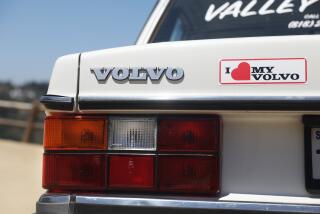Name-Calling Stays in 5th Gear Through Infiniti
- Share via
Since motor cars first crept out on the American landscape, their manufacturers have sought to give them names that might evoke their most desirable qualities--speed, power, comfort, class and mechanical reliability.
They also sought names that appealed to primitive instincts, or aroused sexual fantasies, or implied cultured and sophisticated tastes. Thus we have had the Wolverine, the Bearcat, the Mustang, the Cougar and the Jaguar; the Jackrabbit, the Playboy and the Torpedo; the Regal, the La Salle, and the Peerless.
In the beginning, manufacturers were content to stroke their egos by bestowing their own names on their products: thus, Ford, Dodge, Studebaker--a practice much favored today by the Japanese.
Oddly, in the 1920s the Jordan Motor Car Co. brought out a sport roadster it called the Playboy, but its advertising was aimed at the liberated young woman. “Somewhere west of Laramie,” one ad began, “there’s a bronco-busting, steer-roping girl who knows what I’m talking about. . . . The truth is--the Playboy was built for her. Built for the lass whose face is brown with the sun when the day is done of revel and romp and race. She loves the cross of the wild and the tame.”
There was nothing in this ad about valves, cylinders, brakes, suspension or fuel economy--it was a naked appeal to hormones. It was aimed at the young woman of the ‘20s who necked, wore short skirts, danced the Charleston, drank bathtub gin and lived by her own lights. The term fast lane hadn’t been invented yet, but she was in it.
Inevitably, automobile manufacturers have sought to gain an advantage over their competitors with ever more seductive names. For a time heroes were in fashion--Lafayette, Grant, Rickenbacker. Then the wordsmiths (for the ones who thought up the names were certainly not mechanics) left Earth for the cosmos: Star, Comet, Nova.
Lately the Japanese have shown that their ingenuity exceeds imitation, not only in technology but in semantics. The goal lately seems to have been an appeal to the American taste for high performance and luxury.
Ignoring the fact that there was once an American car named Perfection (perhaps it was too good for this world), the recent ads, at least, seem to have been striving for that image.
For a time BMW led the field by implying that its cars were something more than cars. They were driving machines. Not only that--they were the ultimate driving machines.
What is farther out than ultimate? Why infinity , of course. After months of teasing us with the most insufferably snobbish ads--in one of which, on TV, an old man is seen counseling a younger man on the nature of class--Nissan has introduced the Infiniti--with an i . Evidently the i is meant to keep us from confusing the Infiniti with the ordinary, generic kind of infinity. Now that we know the Infiniti is a motor car (or is it, too, a driving machine?) there is nowhere else to go. Beyond infinity lies what? More infinity.
Perhaps we will drift back to naming cars after their manufacturers, or perhaps their chief executive officers. Remember how the Edsel got its name? The Ford Motor Co., with all its wealth and pretension to cultural sensitivity, employed the celebrated poet Marianne Moore for help in naming its new series of motor cars. (The story is retold in the current Memories magazine.)
Ford advised Miss Moore that they hoped the name would “convey, through association or other conjuration, some visceral feeling of elegance, fleetness, and advanced features and design. . . .”
Noting, prophetically, that it would be hard to match “Thunderbird,” Miss Moore accepted the challenge. Over the next several months she suggested such names as Impeccable, the Resilient Bullet, the Intelligent Whale, the Ford Faberge, Mongoose Civique, Regina Rex, Varsity Stroke, Astranaut, Anticipator, Aeroterre, Thunder Crester and numerous others of similar quality. Her last was Utopian Turtletop.
One can see that the task had exhausted Miss Moore’s imagination.
Finally, more than a year after its first query, Ford wrote Miss Morre a final note:
“We have chosen a name out of the six thousand-odd candidates that we gathered. It has a certain ring to it. An air of gaiety and zest. At least that’s what we keep saying. Our name, Miss Moore, is--Edsel.”
They should of stood in bed.






